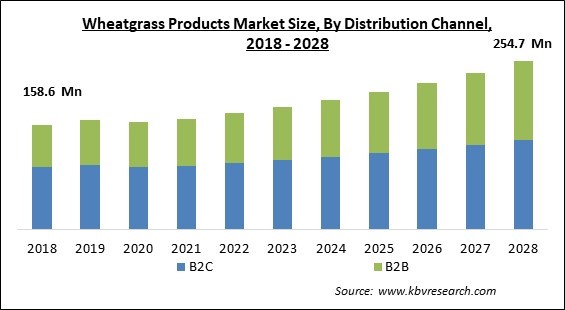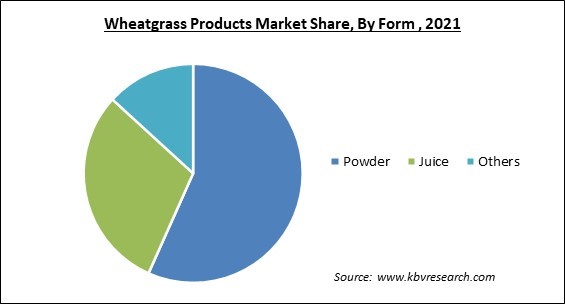
The Global Wheatgrass Products Market size is expected to reach $254.7 Million by 2028, rising at a market growth of 6.4% CAGR during the forecast period.
The juvenile grass of a wheat plant is known as wheatgrass. It looks like hay or straw and is dense, dry grass with a bright green hue. It contributes to natural and holistic therapy and might offer certain particular health advantages. Wheatgrass is the young grass of the Triticum aestivum wheat plant, which is gluten-free. Wheatgrass is taken as a powder or as a drink.

Wheatgrass boosts the immune system, detoxifies the body, and prevents illness. It is a natural source of vitamins and minerals such as calcium, iron, selenium, and magnesium as well as vitamins A, E, C, K, and B6. Wheatgrass has anti-inflammatory and antioxidant properties that make it useful for treating a variety of illnesses, including cancer, diabetes, respiratory conditions, arthritis, etc.
Over the coming years, the pharmaceutical industry is projected to increasingly use wheatgrass to treat a variety of ailments. People now prefer nutritious food as a result of rising health consciousness, which is anticipated to drive market expansion. The natural components and numerous health advantages of wheatgrass products have piqued the curiosity of young people.
Believers in wheatgrass utilize it to attempt and treat a variety of common health issues, such as colds, coughs, fevers, digestive issues, and skin diseases. Additionally, wheatgrass has been used to perhaps treat and prevent more severe illnesses including AIDS and cancer. Wheatgrass is said to contain chlorophyll, the chemical that gives plants their green color, according to those who swear by it. According to some, chlorophyll raises oxygen levels in the body by acting similarly to hemoglobin, the protein found in red blood cells that carries oxygen.
As the pandemic spread, customer demand for health foods surged, presenting the potential for producers of wheatgrass products. However, market revenue has been harmed by supply chain disruptions. However, normal business operations are about to resume. Companies have moved rapidly to put policies and procedures in place at their facilities to safeguard the well-being of their workers while sustaining distribution activities. Since the second quarter of 2021, the use of various wheatgrass-based products has increased, mostly in industrialized nations. The majority of the time, wheatgrass is employed in foods, drinks, and nutraceuticals. Long-term growth will be aided by rising demand for wheatgrass products as a gluten substitute.
Wheatgrass products can be used in cosmetics, skincare, medicines, food and drinks, sports, and nutrition, giving manufacturers a lot of room for research and development. The demand for non-GMO cosmetic components has increased due to the rise in the number of health-conscious consumers worldwide. Parenting-related concerns about the contents of baby care items on the market are growing, and as a result, non-GMO materials are expected to gain popularity shortly. Additionally, eating young wheatgrass is a powerful source of proteins, minerals, vitamins, and active enzymes.
Wheatgrass is incredibly beneficial to overall health because it contains a potent combination of nutrients. It is known as total feeding and has several beneficial therapeutic effects. Due to its diverse combination of vitamins and nutrients, wheatgrass may be an excellent alternative to enhance general health. Wheatgrass has antibacterial, anti-inflammatory, and antioxidant properties. Because of rising family incomes and bettering economic situations, consumers are spending more money on healthy food products, which is driving the growth of the wheatgrass industry.
Headaches have been experienced by some after consuming wheatgrass juice. Even while the juice treats headaches and nausea, consuming too much of it can give a headache. Some people believe that the headache may also be a sign of the body's general intolerance to the juice. Headaches might be less likely if drink less juice. The methanol extract of the juice was shown to be safe at 2000 mg per kg of body weight. To disguise the juice's flavor, consumer can mix it with any other juice. Visit doctor straight away if the headache doesn't go away.
On the basis of Form, the Wheatgrass Product Market is segmented into Powder, Juice, and Others. The juice segment witnessed a significant revenue share in the wheatgrass products market in 2021. It is due to Chlorophyll, which is abundant in wheatgrass juice and functions as an anti-anemia supplement. It supports the body's ability to produce hemoglobin. This is anticipated to be good news for the segment's growth in the upcoming years.

Based on the Distribution Channel, the Wheatgrass Product Market is divided into B2B, and B2C. The B2C segment procured the largest revenue share in the wheatgrass products market in 2021. It is due to the rising levels of consumption at home and rising consumer spending on healthy goods. Walmart stated in January 2022 that it would be expanding its in-home delivery service, intending to increase the number of customers.
| Report Attribute | Details |
|---|---|
| Market size value in 2021 | USD 167.5 Million |
| Market size forecast in 2028 | USD 254.7 Million |
| Base Year | 2021 |
| Historical Period | 2018 to 2020 |
| Forecast Period | 2022 to 2028 |
| Revenue Growth Rate | CAGR of 6.4% from 2022 to 2028 |
| Number of Pages | 184 |
| Number of Tables | 350 |
| Report coverage | Market Trends, Revenue Estimation and Forecast, Segmentation Analysis, Regional and Country Breakdown, Companies Strategic Developments, Company Profiling |
| Segments covered | Form, Distribution Channel, Region |
| Country scope | US, Canada, Mexico, Germany, UK, France, Russia, Spain, Italy, China, Japan, India, South Korea, Singapore, Malaysia, Brazil, Argentina, UAE, Saudi Arabia, South Africa, Nigeria |
| Growth Drivers |
|
| Restraints |
|
Region-wise, the Wheatgrass Product Market is analyzed across North America, Europe, Asia Pacific, and LAMEA. The North America procured the highest region revenue share in the wheatgrass products market in 2021. Because of rising demand for organic foods and a rise in health-conscious consumers, the United States currently holds a monopoly on the wheatgrass market. Furthermore, customers in the United States, Canada, and Mexico are becoming more interested in useful products made from plants.
Free Valuable Insights: Global Wheatgrass Products Market size to reach USD 254.7 Million by 2028
The market research report covers the analysis of key stake holders of the market. Key companies profiled in the report include Myprotein (The Hut Group), Amazing Grass (Glanbia Performance Nutrition, Inc.) (Glanbia PLC), Kapiva Ayurveda (Shree Baidyanath Ayurved Bhawan Pvt. Ltd), Nutriblade LLC, NOW Foods, Inc., Nutrisure Ltd. (Naturya), Navitas Organics, Terrasoul Superfoods, PINES Wheat Grass, and Synergy Natural Products Pty Ltd.
By Distribution Channel
By Form
By Geography
The Wheatgrass Products Market size is projected to reach USD 254.7 Million by 2028.
Non-Modified Ingredients Increasing Wheatgrass Product Sales are driving the market in coming years, however, Wheatgrass Side Effects On Human Body restraints the growth of the market.
Myprotein (The Hut Group), Amazing Grass (Glanbia Performance Nutrition, Inc.) (Glanbia PLC), Kapiva Ayurveda (Shree Baidyanath Ayurved Bhawan Pvt. Ltd), Nutriblade LLC, NOW Foods, Inc., Nutrisure Ltd. (Naturya), Navitas Organics, Terrasoul Superfoods, PINES Wheat Grass, and Synergy Natural Products Pty Ltd.
The expected CAGR of the Wheatgrass Products Market is 6.4% from 2022 to 2028.
The Powder segment acquired maximum revenue share in the Global Wheatgrass Products Market by Form in 2021 thereby, achieving a market value of $136.9 Million by 2028.
The North America market dominated the Global Wheatgrass Products Market by Region in 2021, and would continue to be a dominant market till 2028; thereby, achieving a market value of $90.2 Million by 2028.
Our team of dedicated experts can provide you with attractive expansion opportunities for your business.
